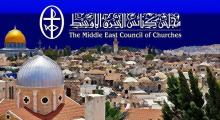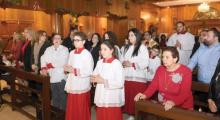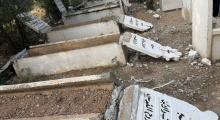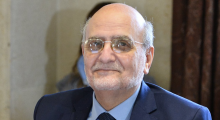Issued by the Catholic Center for Studies and Media - Jordan. Editor-in-chief Fr. Rif'at Bader - موقع أبونا abouna.org
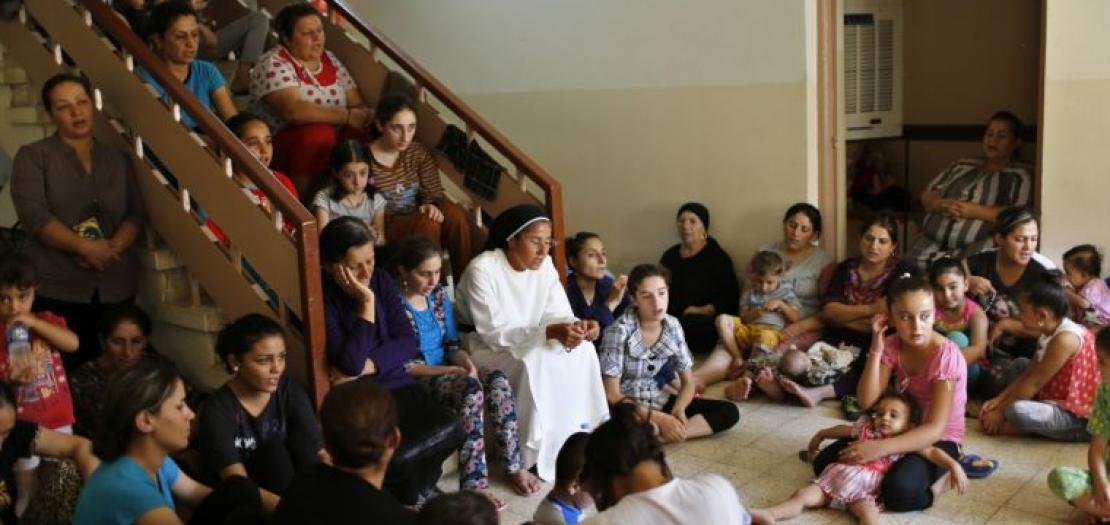
Displaced Iraq Christians who fled from Islamic State militants in Mosul, pray at a school acting as a refugee camp in Erbil, Iraq, September 6, 2014
When ISIS forces captured the city of Mosul in June 2014, the world watched in horror as an ancient city, rich in history and culture, fell under the control of extremists.
The ensuing violence led to one of the largest displacements of people in recent memory, with thousands of Christians, Yazidis, and Muslims forced to flee their homes to escape brutality and persecution.
As the crisis unfolded, one figure emerged as a beacon of hope for those who had lost everything: Chaldean Catholic Archbishop Bashar Warda, CSsR.
A new documentary, 'Learning to Serve in the Face of Terror,' released by Common Home TV, chronicles Archbishop Warda's extraordinary efforts to respond to the humanitarian catastrophe that engulfed northern Iraq. The film, which marks the tenth anniversary of ISIS's rise, provides a compelling account of how the Archbishop, relying on his deep Catholic faith and the charism of the Redemptorists, mobilized resources to provide essential aid, shelter, and spiritual support to those in desperate need.
"It was a surprise to everyone," Archbishop Warda recalls in the documentary. "We knew the dangers of sectarian violence, but no one expected that one day the entire province of Mosul would be hijacked by ISIS in such a short time."
As the leader of the Chaldean Catholic Church in Erbil, Archbishop Warda found himself at the epicenter of a massive humanitarian response. Erbil, the capital of the Kurdistan Region, became a sanctuary for tens of thousands of displaced families. Under Warda's guidance, the church quickly transformed into a hub for relief efforts, providing food, shelter, and medical care to all who sought refuge-regardless of their faith or background.
"People walked for over 12 hours to reach safety because they were completely unprepared for what happened," Warda says, his voice filled with a mix of sorrow and resolve. "We had to respond with whatever resources we had, offering help to all in need."
The documentary not only captures the physical aid provided by Archbishop Warda and his team but also delves into the emotional and spiritual support that became just as vital during this dark period. The Archbishop's leadership, rooted in the principles of Catholic social teaching, emphasized the dignity of every human person, solidarity with the suffering, and the need for peace and reconciliation.
"His actions are a testament to what Catholic social teaching truly means," says Matthew Howard, Producer of the video. "Archbishop Warda didn't just provide food and shelter; he offered hope and the strength of faith to those who had lost everything."
Indeed, Archbishop Warda's work went beyond mere survival. He was instrumental in fostering dialogue with Islamic scholars, addressing the root causes of extremism, and advocating for long-term peace in a region scarred by conflict.
"Learning to Serve in the Face of Terror" offers viewers a rare glimpse into the resilience and compassion that defined Archbishop Warda's response to the crisis. Through interviews, archival footage, and personal stories, the documentary paints a vivid picture of a man whose faith was both a source of strength and a guiding light in the darkest of times.
The film is available for viewing as both a video and a podcast, allowing audiences around the world to engage with this powerful story. compelling narrative experience.
As Iraq continues its slow and challenging process of rebuilding, the lessons drawn from Archbishop Warda's leadership have never been more relevant. His story stands as a powerful testament to the enduring strength of compassion, faith, and justice, even in the face of overwhelming terror. Archbishop Warda's actions remind us that true leadership is not measured by the ability to wield power, but by the capacity to uplift the most vulnerable, to offer hope where there is despair, and to forge a path towards reconciliation and peace.
His unwavering commitment to serving all those in need, regardless of their background, highlights a universal truth: that in the darkest of times, it is our shared humanity and moral courage that have the power to overcome hatred and violence. As communities in Iraq and beyond look toward a future of healing and renewal, the values exemplified by Archbishop Warda serve as a guiding light, showing us that even in the most trying circumstances, we can choose to respond with kindness, solidarity, and a steadfast dedication to justice.


